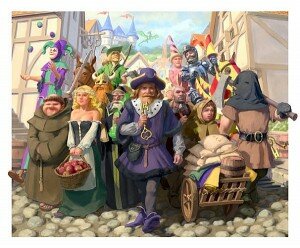
 Games Arena: The European Middle Ages haven’t been a very popular subject for City Building games over the years. We’ve had Ancient Rome, Ancient Egypt, Ancient Greece, Ancient China, why would you say it’s taken so long to get to this time period?
Games Arena: The European Middle Ages haven’t been a very popular subject for City Building games over the years. We’ve had Ancient Rome, Ancient Egypt, Ancient Greece, Ancient China, why would you say it’s taken so long to get to this time period?
Chris Beatrice: It’s funny, yeah, but we think that is a huge missed opportunity.
Back in the day the “builder” games, including empire building games, kind of developed a tradition of being set in the ancient world. I think this was in part a direct influence of the success of Civilization, but also it’s because in these games you are building up something from scratch, starting with nothing and ending with something magnificent, and that certainly fits nicely with the rise of the ancient historical civilizations. At the same time, the medieval and medieval fantasy setting was and has remained very well represented in other genres, usually with a focus on combat, castles, adventuring, etc. Somewhere along the lines we stopped associating the Middle Ages with learning, culture and advancement, which is kind of funny when you think of it, because the ancient classical civilizations ended in collapse, whereas the medieval period culminated in the Renaissance.
Also, starting in the so-called “dark ages” in fact works really well for a game that is about building up something from nothing. It’s kind of like a “turnaround” situation, which can be really compelling. Whether you’re relearning or resurrecting ancient knowledge, or advancing science and culture in whole new ways, in any case you are advancing civilization at a really rapid rate compared to how it worked the first time around, in the ancient world. So the medieval period actually provides a really nice progression in terms of syncing up with the dynamic of city-building, which is really about building up a civilization and advancing culture.
One other great thing about this period is that it is not so far removed from today, especially compared to, say, ancient Egypt, where most people have no idea what the different gods represent, for example, or ancient Rome, where most people have never heard of a “Rhetor” or whatever. Instead we have folks like cobblers and bakers, beekeepers, jugglers, friars and so on.
GA:What period specifically are you targeting with Medieval Mayor? What is the starting point, is it going to reach into the Renaissance, or will that be the cutoff point in terms of culture and technology?
CB:The time period is not rigidly defined, but if I had to nail it down in terms of thematic inspiration we’re basically talking roughly 800 to 1350 AD, give or take. The important thing is that the game starts well after the collapse of the classical world, and ends before the Renaissance proper, to answer your question more specifically. As I think you alluded to, this was a period of great innovation and advancement.
GA:Will you be making Medieval Mayor a 3D game, or are you going to return to the 2D style of the older City Builder games?
CB:Nope, it’s 2d isometric. We’ve pretty much come full circle in seeing the gameplay value of a clear, 2D representation. Like many things with city-building games, it’s nice in theory to be able to “walk the streets”, but not necessarily valuable in reality (ok, it’s nice in reality too, but maybe not worth the sacrifice in gameplay clarity and accessibility). We think 2D works better in terms of players being able to tell what’s going on at a glance, even at the expense of a more “realistic” representation of the game world.
GA: What is the scale you are aiming for in terms of maps and the size of cities?
CB: I’m not sure how to quantify that… there is definitely a critical threshold below which the city does not feel like a city, but more like a small village or not even anything consolidated at all… where you start to think of individuals vs. the city as an organic whole, so to speak. As a side note, this is a specific challenge in making a city-building game feel like a city-building game, and one that is probably under-appreciated by both developers and players! I mention that only because I see that question about walkers coming up… Anyway, that being said, there are maps of different sizes, and lots of map-based constraints and considerations when building your city, such as resource harvest locations, farmland, etc.
GA: Can you give any details about the campaign of the game, and what kind of challenges we can expect to face?
CB: This is one area for which Jeff and I are still exploring a few different possibilities. One thing we are doing is focusing gameplay on a single city, vs. a long series of similar cities where you have to (re)start from scratch each time. That’s not to say you can’t build as many cities as you like in freeform play, or by replaying campaigns, but rather that within a campaign we’re focusing on keeping the challenges alive and growing within a single city as it advances through time.
GA:You’ve mentioned that the game will feature a walker system, is it going to include roadblocks and route management like previous games? And are production chains going to work in the same way, with farms, granaries, stockpiles, markets, or are you going to modify the economy?
CB:As you know this is an area of much debate and, I daresay, even controversy! Over the years we have worked through so many different types of figure-based city simulation systems it’d probably make your head spin! We’ve seen what works and what doesn’t work, what is fun, and what maybe only seems fun… We’ve seen systems that are really enjoyable, but at the same time irritating to deal with… we’ve seen systems that are cool and compelling, but inherently unmanageable, and so on. What I can tell you right now is that the game is certainly “walker-based” in that all the core systems within the city, that is, resource distribution, services, etc. are carried out by little people walking and carrying stuff around the map, vs. some kind of radius-based or pseudo walker system, and that roads are the primary constraint and therefore the primary control system for this. That is what we think makes for the most fun and most uniquely city-building experience. Beyond that we are working to optimize the gameplay experience by balancing player control (both direct and indirect) with walker AI (some are smarter than others, by design).
GA: Apart from making a large well functioning city, one of the most enjoyable parts of these games was building great monuments, whether it was pyramids or grand temples. Is Medieval Mayor going to have similar projects the players can undertake, like castles, or great cathedrals?
CB: Yeah, those pyramids were something… anyway, yes, we do have cathedrals and other large religious buildings and monuments, but not castles. As I alluded to in the first question, in Medieval Mayor the focus is not on the rural countryside, castles and combat, but rather on the (relatively advanced) life of the city. Relative to so many other medieval games, this is almost a twist, even though it’s fairly historical.
GA: Are we going to see any jousting tournaments in the game, to increase the fame of the city, like Zeus had the Olympics?
CB: Yes, there are some things like that, but not dealing with city “fame” specifically. Also, as noted above, the focus here is not on the grit and grime of the countryside, well, that is to say, your goal is to rise above that and build a glorious city and civilization.
GA: Seeing as how it’s the Middle Ages, and there is religion in it, can we expect the Inquisition? Spanish or otherwise. Also, how much of an impact will religion have, when compared to something like Zeus, where gods walked among men and periodically burned down cities?
CB: We’re definitely downplaying the position of Christianity relative to its obviously very dominant role during this period historically. We’re really not treating it very different from any of the other religions in the game. In part this is because Medieval Mayor is not 100% historical, but that being said, even historically different groups continued to worship their local pagan gods, and/or merge them with Christian beliefs and practices, and we think that makes for a very rich setting. Since the game starts early in the medieval period (where paganism was more common than later, especially in Scandinavia), YOU are building the civilization YOU want, and as that civilization advances over hundreds of years maybe other gods are worshiped more, for example. In fact, in Medieval Mayor there are usually many different ways to skin a cat, so to speak. For example, healthcare in this period could include faith healers of various religions (including Christianity) as well as some more science-based practitioners, the forerunners of modern doctors. These are all available in Medieval Mayor as well.
GA: How will warfare be handled in the game? And are the crusades factored into it, like having to send troops to the war?
CB: We are not planning to include combat proper, as it tends to not mesh well with core city-building gameplay. But yes, military support (and other ways of supporting the crown) is an important challenge for you to have to deal with.
GA: Do you have plans for any multiplayer features, or something like on-line city rankings?
CB: Although we will not have any head to head multiplayer, or any abilities to directly influence other players’ cities, but we will encourage interaction between friends in gaming communities such as Steam. Going beyond just achievements, though, we are also planning to integrate social media challenges between friends to compete for high scores, and may have some sort of online score keeping/achievements as well.
It’s likely that by the time Medieval Mayor is released there will be new ways of using Google, Steam, and so on to create small ‘clans’ of friends competing, comparing or just having fun ‘together’, and we will definitely avail ourselves of these possibilities.
GA: When do you expect to release Medieval Mayor, and what platforms/operating systems are you targeting?
CB: We’re aiming for next year, and will start with downloadable / PC, though the game is
being developed in a cross-platform environment so we can move on to iPad and other tablets once we work through some specific UI issues. One of our goals is to be able to bring the experience of… “real” city-building to tablets.
GA: Thank you for your time.










The time period 1347 to 1350 is the singulalry most important era in Eurpoean history and the effects of the plaque should not be discounted. The economic termoil as a result of losing between 1/3 – 1/2 of the population led to severe economic and religious challenges.
i hope the game accounts for such a dramatic event.